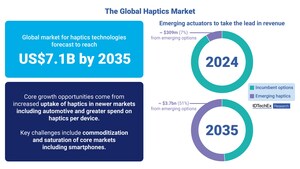BOSTON, Aug. 18, 2021 /PRNewswire/ -- AI in drug discovery is a field that has received an immense increase in interest, uptake, and investment over the past year due to the COVID-19 pandemic. While lockdowns forced everyone around the world to explore virtual ways of working, the biopharma industry faced the additional task of quickly developing new drugs for the treatment of COVID-19. Enter the application of AI in drug discovery – a technology that promises to drastically cut down timelines and costs, and potentially, develop safer and more efficacious drugs.
IDTechEx have recently published a report, "AI in Drug Discovery 2021: Players, Technologies, and Applications" which covers this topic in detail. For more information, please visit www.IDTechEx.com/AIDisc
How is AI Used in Drug Discovery?
AI can be applied at multiple stages across the drug discovery process, from the screening of compounds that interact with a target of interest (hit screening), design of new molecules (de novo drug design) through to the optimization of properties such as absorption and distribution (lead optimization).
Structure-Based Hit Screening
One of the most developed AI drug discovery technologies is its application in structure-based hit screening. Here, the task is to identify molecules from a database that can interact with a target that has a known 3D structure. With sufficient binding affinity, a molecule would be considered a "hit" worthy of further investigation. AI such as convolutional neural networks (CNNs), variational autoencoders (VAEs), and support vector machines (SVMs) are commonly used in structure-based hit screening. Researchers train algorithms using large, shared drug databases of experimentally derived results of ligand/target binding affinities, such as PubChem, ChEMBL, ChemBank, DrugBank, ChemBridge, and more.
De Novo Drug Design
Unlike virtual screening, de novo drug design focuses on the creation of new molecules from scratch – de novo is Latin for "anew". Again, AI models are trained using chemical libraries and identify fragments and chemical groups required based on what is known about the target, such as its 3D structure or known fragments that bind. AI such as recurrent neural networks (RNNs) and generative adversarial networks (GANs) are often used in de novo drug design. Compounds can be represented as strings (simplified molecular-input line-entry specification, SMILES), and the AI simply predicts the next "character" in the string, which can be atoms, types of bonds, etc.
What are the Limitations of AI in Drug Discovery?
While the application of AI to drug discovery holds great promise, there are multiple factors holding the technology back. Many of these involve data.
Biology is complex: Chemistry can be handled computationally but taking the example of structure-based hit screening, biology is not simply about structure. In many cases, researchers simply do not have sufficient biological information, or the understanding of which information is important, to train AI meaningfully. Researchers are also trying to determine the best ways to label biological information for AI training. As such, AI is exceedingly good at ligand discovery, but less so at drug discovery – just because a compound can bind to a target does not mean that it can have a physiologically beneficial response.
Negative results are not published: There are few avenues for publishing negative results as a part of the scientific method today. This has two major implications. First, there are very few datasets of negative results that can be used to train AI algorithms. Once a researcher knows that the drug efficacy is low (high concentration required to achieve 50% inhibition of the target), they often do not report the results. Second, failed results are never published, meaning that the same experiments may be repeatedly conducted by successive researchers who pick the compound out of the database.
What's Next?
The application of AI in drug discovery is helping to tackle big challenges of time and cost in drug development. There has been a surge in investment into AI drug discovery companies over the past 3 years, with increasingly many partnerships between AI companies and the biopharma industry. And while there are still key issues to be addressed in the development of AI for drug discovery, companies have already advanced several compounds into pivotal clinical trials without biopharma partners. The success of these candidates will definitively prove the value of AI in drug discovery.
For more information on "AI in Drug Discovery 2021: Players, Technologies, and Applications", please visit www.IDTechEx.com/AIDisc, for the full portfolio of Healthcare related research available from IDTechEx please visit www.IDTechEx.com/Research/Healthcare.
Image Downloads:
https://www.dropbox.com/sh/04plruagmrmsx8e/AACnXZE5WXKAGCPh5jjj_1Nha?dl=0
About IDTechEx
IDTechEx guides your strategic business decisions through its Research, Subscription and Consultancy products, helping you profit from emerging technologies. For more information, contact [email protected] or visit www.IDTechEx.com.
Media Contact:
Natalie Moreton
Digital Marketing Manager
[email protected]
+44(0)1223 812300
Social Media Links:
Twitter: https://www.twitter.com/IDTechEx
LinkedIn: https://www.linkedin.com/company/idtechex/
Facebook: https://www.facebook.com/IDTechExResearch
SOURCE IDTechEx

WANT YOUR COMPANY'S NEWS FEATURED ON PRNEWSWIRE.COM?
Newsrooms &
Influencers
Digital Media
Outlets
Journalists
Opted In






Share this article